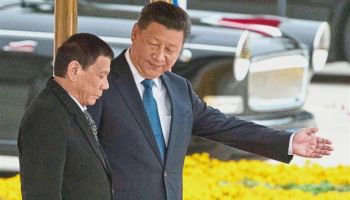https://youtu.be/qB80PG8C-I0
https://youtu.be/VWid1poNGuk
https://youtu.be/L67WJiO_CQk
https://youtu.be/eWOMhvTrrOg
https://youtu.be/VWid1poNGuk
https://youtu.be/L67WJiO_CQk
https://youtu.be/eWOMhvTrrOg
Chinese President Xi Jinping delivered a keynote
speech at the opening ceremony of the Second Belt and Road Forum for
International Cooperation (BRF) in Beijing on Friday. Here are the
highlights:
On Belt and Road Initiative
Xi said that the Belt and Road Initiative
(BRI) aims to build a trade and infrastructure network, adding that
joint building of the Belt and Road has opened up new space for the
world's economic growth.
Based on the principles of equality and
mutual benefit, the BRI focuses on connectivity and practical
cooperation to achieve win-win outcomes and common development.
The principle of extensive consultation,
joint contribution and shared benefits should be upheld, Xi said, and
open, green and clean approaches should be adhered to.
The goals of high-standard, livelihood-improving and sustainable development should be achieved, according to Xi.
China will work with other parties to promote
a coalition of sustainable cities and an international coalition for
green development under the Belt and Road Initiative, Xi said.
High-quality infrastructure under BRI
Xi highlighted building infrastructure of
high quality, sustainability, risk resilience, reasonable pricing,
inclusiveness and accessibility under the BRI.
Calling infrastructure the cornerstone of
connectivity and a bottleneck of development confronting many countries,
Xi said building infrastructure with such standards could help
countries give full play to their advantages in resources and better
integrate into the global supply, industry and value chains for
interconnected development.
On people-to-people connectivity
China will support 5,000 people from the
innovation sector in Belt and Road countries in conducting exchanges,
training programs and joint research over the next five years.
China will work with other participants of
the Belt and Road Initiative to promote scientific and cultural
exchanges, set up joint science labs, build science and technology
parks, and promote the transfer of technologies, Xi said.
A total of 10,000 representatives of
political parties, think tanks and non-governmental organizations from
countries participating in the Belt and Road Initiative will be invited
to China for exchanges in the next five years.
On trade and opening-up
Xi said that China will increase imports of
goods and services on a larger scale, slash its negative list on imports
and will negotiate and sign high-standard free trade agreements with
more countries.
China will further lower its tariff rates and
the country would continuously open up its market and welcome quality
products from around the world.
China is also willing to import more
competitive farm produces, finished products and services and will allow
foreign investors to operate businesses in more sectors with
controlling or full stake.
China prohibits forced technology transfer
China will step up protecting the legitimate
rights and interests of foreign owners of intellectual property rights,
and prohibit the forced transfer of technology, Xi said.
It will create a business environment in which the value of knowledge is respected, Xi said.
(With input from Xinhua)
Read more













